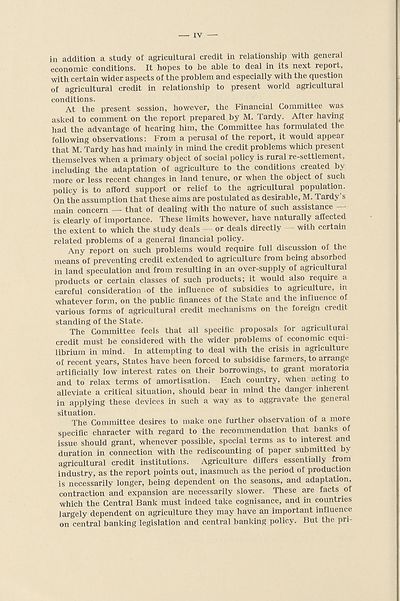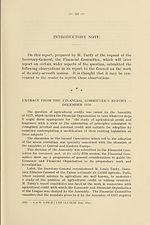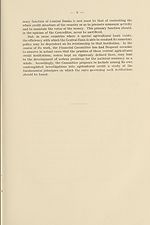Download files
Complete book:
Individual page:
Thumbnail gallery: Grid view | List view

IV
in addition a study of agricultural credit in relationship with general
economic conditions. It hopes to be able to deal in its next report,
with certain wider aspects of the problem and especially with the question
of agricultural credit in relationship to present world agricultural
conditions.
At the present session, however, the Mnancial Committee was
asked to comment on the report prepared by M. lardy. After having
had the advantage of hearing him, the Committee has formulated the
following observations: From a perusal of the report, it would appeal
that M. Tardy has had mainly in mind the credit problems which present
themselves when a primary object of social policy is rural re-settlement,
including the adaptation of agriculture to the conditions created by
more or less recent changes in land tenure, or when the object of such
policy is to afford support or relief to the agricultural population.
On the assumption that these aims are postulated as desirable, M. 1 ardy s
main concern — that of dealing with the nature of such assistance —
is clearly of importance. These limits however, have naturally affected
the extent to which the study deals — or deals directly — with certain
related problems of a general financial policy.
Any report on such problems would require full discussion of the
means of preventing credit extended to agriculture from being absorbed
in land speculation and from resulting in an over-supply of agricultural
products or certain classes of such products; it would also require a
careful consideration of the influence of subsidies to agriculture, in
whatever form, on the public finances of the State and the influence of
various forms of agricultural credit mechanisms on the foreign credit
standing of the State.
The Committee feels that all specific proposals for agricultural
credit must be considered with the wider problems of economic equi¬
librium in mind. In attempting to deal with the crisis in agriculture
of recent years, States have been forced to subsidise farmers, to arrange
artificially low interest rates on their borrowings, to grant moratoria
and to relax terms of amortisation. Each country, when acting to
alleviate a critical situation, should bear in mind the danger inherent
in applying these devices in such a way as to aggravate the general
situation.
The Committee desires to make one further observation of a more
specific character with regard to the recommendation that banks of
issue should grant, whenever possible, special terms as to interest and
duration in connection with the rediscounting of paper submitted b\
agricultural credit institutions. Agriculture differs essentially from
industry, as the report points out, inasmuch as the period of production
is necessarily longer, being dependent on the seasons, and adaptation,
contraction and expansion are necessarily slower. These are facts of
which the Central Bank must indeed take cognisance, and in countries
largely dependent on agriculture they may have an important influence
on central banking legislation and central banking policy. But the pri-
in addition a study of agricultural credit in relationship with general
economic conditions. It hopes to be able to deal in its next report,
with certain wider aspects of the problem and especially with the question
of agricultural credit in relationship to present world agricultural
conditions.
At the present session, however, the Mnancial Committee was
asked to comment on the report prepared by M. lardy. After having
had the advantage of hearing him, the Committee has formulated the
following observations: From a perusal of the report, it would appeal
that M. Tardy has had mainly in mind the credit problems which present
themselves when a primary object of social policy is rural re-settlement,
including the adaptation of agriculture to the conditions created by
more or less recent changes in land tenure, or when the object of such
policy is to afford support or relief to the agricultural population.
On the assumption that these aims are postulated as desirable, M. 1 ardy s
main concern — that of dealing with the nature of such assistance —
is clearly of importance. These limits however, have naturally affected
the extent to which the study deals — or deals directly — with certain
related problems of a general financial policy.
Any report on such problems would require full discussion of the
means of preventing credit extended to agriculture from being absorbed
in land speculation and from resulting in an over-supply of agricultural
products or certain classes of such products; it would also require a
careful consideration of the influence of subsidies to agriculture, in
whatever form, on the public finances of the State and the influence of
various forms of agricultural credit mechanisms on the foreign credit
standing of the State.
The Committee feels that all specific proposals for agricultural
credit must be considered with the wider problems of economic equi¬
librium in mind. In attempting to deal with the crisis in agriculture
of recent years, States have been forced to subsidise farmers, to arrange
artificially low interest rates on their borrowings, to grant moratoria
and to relax terms of amortisation. Each country, when acting to
alleviate a critical situation, should bear in mind the danger inherent
in applying these devices in such a way as to aggravate the general
situation.
The Committee desires to make one further observation of a more
specific character with regard to the recommendation that banks of
issue should grant, whenever possible, special terms as to interest and
duration in connection with the rediscounting of paper submitted b\
agricultural credit institutions. Agriculture differs essentially from
industry, as the report points out, inasmuch as the period of production
is necessarily longer, being dependent on the seasons, and adaptation,
contraction and expansion are necessarily slower. These are facts of
which the Central Bank must indeed take cognisance, and in countries
largely dependent on agriculture they may have an important influence
on central banking legislation and central banking policy. But the pri-
Set display mode to:
![]() Universal Viewer |
Universal Viewer | ![]() Mirador |
Large image | Transcription
Mirador |
Large image | Transcription
Images and transcriptions on this page, including medium image downloads, may be used under the Creative Commons Attribution 4.0 International Licence unless otherwise stated. ![]()
| League of Nations > Economic and financial section > Report on systems of Agricultural credit and insurance > (6) |
|---|
| Permanent URL | https://digital.nls.uk/190543312 |
|---|
| Shelfmark | LN.II |
|---|
| Description | Over 1,200 documents from the non-political organs of the League of Nations that dealt with health, disarmament, economic and financial matters for the duration of the League (1919-1945). Also online are statistical bulletins, essential facts, and an overview of the League by the first Secretary General, Sir Eric Drummond. These items are part of the Official Publications collection at the National Library of Scotland. |
|---|---|
| Additional NLS resources: |
|

